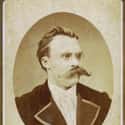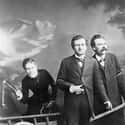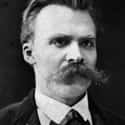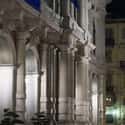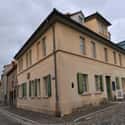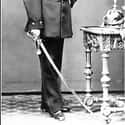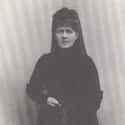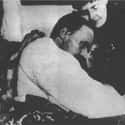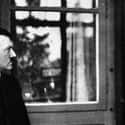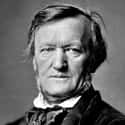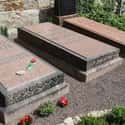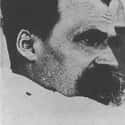-
(#1) Nietzsche Became A Professor At The Age Of 25 - An Unheard Of Achievement
Friedrich Nietzsche was appointed as a full professor of philology at the University of Basel at the age of 25. In the fall of 1868, Nietzsche's professor and mentor at the University of Leipzig, Friedrich Ritschl, had recommended Nietzsche for a vacancy at the University of Basel, despite the fact that Nietzsche had not yet finished his doctoral studies.
The University of Basel conferred the degree sight unseen based on Ritschl's glowing review; Nietzsche began teaching right away in the summer of 1869 and was quickly promoted to a full professorship - a rather remarkable accomplishment.
-
(#2) Nietzsche Had Only One Romantic Relationship, Which Remained Disastrously Platonic
It is ironic that Nietzsche once famously stated, "Ah, women. They make the highs higher and the lows more frequent," as he never married and experienced only one platonic romance that went utterly unrequited. On April 25, 1882, he was introduced by a former student and philosopher, Paul Ree, to 21-year-old Lou-Andreas Salome at St. Peter's Basilica in Rome. Nietzsche greeted the attractive woman with the phrase, "From what stars have we fallen together here?" Salome, a bit more grounded, replied, "I came from Zurich." Within one week, the socially inept Nietzsche not only proposed marriage, but did so through Paul Ree, who was also interested in Salome. Salome tactfully declined, but the hapless Nietzsche would propose two more times before finally catching on that Lou really wasn't interested.
Nietzsche initially had a sense of humor about the situation and naively clung to the original notion of the threesome's association - a philosophical commune. He arranged the famous photograph of Ree and himself tethered to a cart being symbolically lead by Lou Salome. Throughout the summer and fall of 1882, Nietzsche would continue this hapless courtship until Ree and Salome moved in together in Berlin. By the following year, Nietzsche was bitterly denouncing the couple to anyone who would listen.
-
(#3) Nietzsche Retired In His Thirties And Lived Out Of A Suitcase
For most of his life, Nietzsche was plagued by various maladies, both real and possibly imagined. He was most profoundly affected by incapacitating headaches, poor digestion, and nausea. The fact that he had extremely poor eyesight to the point of veritable blindness also did not help his constitution. These afflictions would frequently interrupt his professional life, and led to days of bed rest and isolation.
Finally, these chronic conditions forced Nietzsche to resign from his professor's chair on May 2, 1879. Through an intervention by the department chairman, he would go on to receive a pension equal to roughly two thirds of his annual salary for a period of six years. This would eventually be extended and would be paid to him up until 1897, when his sister Elizabeth requested it be halted. Nietzsche used this stipend to travel in a perpetual circle between southern France and Italy in the winter and Switzerland and Germany in the summer, living in rented rooms and boarding houses while working on a succession of manuscripts.
-
(#4) In 1889, Nietzsche Had A Psychotic Break And Never Wrote Anything Again
On January 3, 1889, two policemen in the city of Turin, Italy approached a disturbance in the Piazza Carlo Alberto. They apprehended a man who had allegedly broken down after witnessing the flogging of a horse. The man was so overcome at witnessing this brutality that he ran up and threw his arms around the animal, attempting to stop the beating. He subsequently collapsed unconscious onto the pavement.
Identified as Friedrich Nietzsche, a German living in a nearby rooming house, his landlord was located and the afflicted man was carried back to his room. Although it would take days for Nietzsche's friends and relatives to become aware of his condition, the philosopher's mental prognosis would remain unchanged until his death in 1900, and he would not say or write anything intelligible for the rest of his life.
-
(#5) After Nietzsche's Breakdown, He Lived In His Mother's Attic
In his apartment, Nietzsche was sedated but continued to behave erratically, sending grandiose letters to Richard Wagner's wife, Cosima - with whom he had not communicated in years - and to his former teaching associates at the University of Basel, Franz Oberbeck and Jacob Burckhardt, and even to German chancellor, Otto von Bizmarck. These letters, known as the "Madness Letters" clearly indicated an unhinged mind. Prior to his breakdown, his landlady had heard him loudly playing the piano at night while dancing erratically in the nude.
Familiar with his professional contacts in Basel, Nietzsche's landlord contacted Franz Oberbeck, who came and managed to get Nietzsche back to Basel after a harrowing train ride. Nietzsche's mother, Franziska, then took custody of him and committed her son to an asylum at Jena, but eventually it was acknowledged that nothing could be done. Mute and with no ability to write coherently, Nietzsche lived in his hometown of Naumburg, Germany, on the third floor of his mother's home until her death in 1897.
-
(#6) Nietzsche's Breakdown Was Diagnosed As Syphilis, Probably Contracted During The Franco-Prussian War
Although revisionist historians have sought out other explanations, at the time of his confinement in a mental asylum in 1890 after his mental breakdown, Nietzsche was diagnosed with third stage syphilis. This explains why, following his release into his mother's custody in 1890, nothing further was done to try to improve Nietzsche's condition, which was believed to be incurable and degenerative.
It is believed that the disease was contracted while Nietzsche served as a cavalryman during the Franco-Prussian War. Modern historians have attempted to explain Nietzsche's condition as the result of cancer or even various extremely rare neurological disorders.
-
(#7) His Sister Married An Anti-Semite And Then Attempted To Establish A German Colony In Paraguay
Nietzsche's relationship with his only sibling, Elizabeth, was always volatile and quite hostile. He openly quarreled with her during his abortive relationship with Lou Salome - Elizabeth believing from the beginning that Salome was insincere and exploitative. He considered Elizabeth to be his intellectual inferior, and part of his perpetual wandering throughout Europe was based in his reluctance to spend time with either his sibling or his mother:
"I don’t like my mother and it’s painful even for me to hear my sister’s voice."
His aversion only became greater when Elizabeth became romantically involved with one of Germany's most notorious anti-Semites of the day, Bernhard Foerster. Though he was still on speaking terms with his sister at the time, Nietzsche refused to come to the couple's wedding or give his blessing. By then, Foerster and Elizabeth had become intent upon establishing a German colony in Paraguay called "Nueva Germania," where only couples considered to be racially pure were to be admitted. Founded in 1887, the colony would rapidly collapse after Foerster's suicide and Elizabeth's hasty sale of any assets before her return to Germany in 1893. However, some of the descendants of the "Nueva Germania" colony still live in the town today.
-
(#8) Nietzsche's Sister Stole His Copyrights And Distorted His Beliefs
One of the reasons that Elizabeth Nietzsche so hastily returned to Germany was because of the increased attention suddenly being paid to her now incapacitated brother's writings and philosophy. She elbowed her mother and other relatives out of the way and got her herself appointed as the legal custodian of his copyrights and legal affairs. She published a two-volume, self-aggrandizing biography that minimized the break with Wagner, Nietzsche's dislike of German nationalism, and his contempt for religion and Christianity. She also published The Will to Power, ostensibly written by her brother but carefully crafted by Elizabeth to espouse and validate her own right-wing, militaristic perspective.
When Nietzsche's mother died in 1897, Elizabeth transported her brother to Weimar and exploited him to raise money for a "Nietzsche Archive." She eagerly promoted her brother as being philosophically wedded to the nationalist, anti-Semitic attitudes that would sweep through Germany during the beginning of the twentieth century - a promotion that conformed to her own beliefs but also generated a great deal of money.
-
(#9) Hitler Attempted To Use Nietzsche's Intellectual Perspective To Legitimize The Nazis
As enthusiastic as Elizabeth Nietzsche was about Hitler and the Nazi Party, Adolf Hitler was just as eager to capitalize on his apparent Nietzsche-connection. He visited the Nietzsche Archive on numerous occasions, using it as an opportunity to associate himself with the ideas of a noted intellectual and philosopher.
Hitler incorporated the phrases "Ubermensch," or Superman, "Will to Power," and "Twilight of the Gods" into the Nazi lexicon and ideology propoganda, even though Nietzsche openly despised German nationalism, anti-semitism, and referred to a "Superman" as someone who would achieve ideal perfection through reason and artistic creation. That his ideas would have been used to justify the creation of a "Master Race" that would subjugate allegedly inferior peoples through militaristic brutality would have completely horrified Nietzsche. And because Germany perceived the Nazi party as a group of brutal thugs, Hitler craved the intellectual legitimacy that a link to Nietzsche would bestow.
-
(#10) An Initial Admirer And Confidant of Richard Wagner, Nietzsche Ultimately Became Estranged
Friedrich Ritschl was responsible for introducing Nietzsche to composer Richard Wagner while the three resided in the vicinity of Leipzig. Wagner was initially delighted by Nietzsche's favorable philosophical comparisons of his music to classical influences in Nietzsche's first book, The Birth of Tragedy. The young philosopher was invited to spend holidays with the composer and his mistress and eventual wife, Cosima, at the their Swiss villa at Tribschen, on Lake Lucerne.
But Wagner was also always looking for ways to increase his own success and mainstream popularity, and his egocentric personality, anti-Semitism, and use of Christian themes ultimately alienated Nietzsche. When Nietzsche's writings became unenthusiastic, Wagner and his wife distanced themselves, especially after he began his radical examinations of religion and Christianity. The two men would last see each other on November 5, 1876, and Wagner would die of a massive heart attack in 1883, having never spoken to Nietzsche again.
-
(#11) Nietzsche Died In 1900, 33 Years Before Hitler Became Politically Powerful
Friedrich Nietzsche died three years after he was moved from his mother's home in Naumburg to his sister's home in Weimar - the same house that would eventually contain the Nietzsche Archive. This was 23 years before Hitler would become politically relevant, and 33 years before he would officially gain control of the German government.
Nevertheless, Nietzsche has been irreparably associated with the anti-Semitic ideologies of Hitler and the Nazis. Following World War II and the partition of Germany, the director of the Nietzsche Archive was disappeared into a Soviet gulag and Nietzsche's works were officially banned in the Iron Curtain countries, including East Germany. It was not until reunification in 1991 that the Archive was reopened and Nietzsche's works became available in the region where the philosopher was raised. One final indignity that has not yet been rectified was the reburial of Nietzsche following the death of Elizabeth in 1935. His coffin was removed from its prominent place between his two parents and placed nearby, while Elizabeth was buried and remains in the more high profile position.
-
(#12) Nietzsche Did Not Achieve Any Real Attention During His Lifetime
Friedrich Nietzsche's books sold poorly if at all during his lifetime, with the first printings of 500 to 1,000 copies occasionally selling out, and many of his books simply going out of print after their first publication. In fact, because of his views, which were crystallized in the statement "God is dead," some printers actually refused to print his manuscripts.
Additionally, during his academic career, his classes were sometimes poorly subscribed to due to his ideas being perceived as dangerously radical. Only toward the end of his life would his writings be examined, usually by other intellectuals and philosophers intrigued by his ideas concerning religion and Christianity.
New Random Displays Display All By Ranking
About This Tool
Friedrich Nietzsche was the most famous philosopher and poet of the 19th century who had a great influence on the development of philosophy. H literature works have provided extensive criticism and discussion in the fields of religion, philosophy, and science, etc. At the age of 24, he already became a professor of classical literature in the German-speaking of the University of Basel, specializing in ancient Greek and Latin literature.
Unfortunately, he resigned due to health problems in 1879 and has been suffering from mental illness ever since, he breakdown in 1889 has never recovered. He firmly affirmed the value of humans and the importance of independent thinking but failed to overcome mental illness. The random tool introduced 12 details about his miserable but fascinating life.
Our data comes from Ranker, If you want to participate in the ranking of items displayed on this page, please click here.











